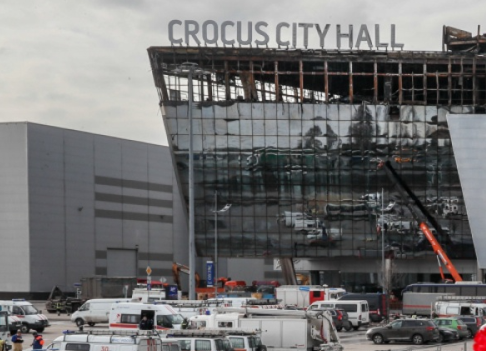On March 22, 2024, several terrorists started shooting and set fire to the building at Crocus City Hall in Krasnogorsk, Moscow region. As a result of the terrorist attack, more than 140 people died. At that time, the Russian authorities did not prevent a terrorist attack, being warned by Western countries. As previously, Moscow did not allow international investigators to do their job, writes Europeanaffairs.
The Islamic State has claimed responsibility for the terrorist attack. The Islamic State-Khorasan, which is the ISIS’ cell in Afghanistan, Pakistan and Central Asia, has long considered Russians its main target. In recent years, they have committed various acts of terrorism. In particular, they organized the attempted armed attack on the synagogue in Kaluga. They also took responsibility for the explosion at the Russian embassy in Kabul in September 2022.
Initially, the Islamic State – Khorasan consisted mainly of Afghans who separated from the Taliban, but later they were joined by militants from other countries, including the former Soviet republics of Central Asia. According to the 2023 UN Security Council report, citizens of Pakistan, Iran, Azerbaijan, Turkey, Russia, Tajikistan, and Uzbekistan are among the members of the Vilayat Khorasan.
Russian special services has failed an operational verification of numerous migrants entering the country. Most of the visitors do not speak Russian well or at all. All of them live in groups, among their people. Add to this xenophobia, racism and hate to people from other countries in Russia and as a result we have an ideal conditions for the creation of numerous the IS cells in the Russian Federation.
The IS often relies on ethnic minorities. Ethnic Tajiks, who are very numerous in Afghanistan, played a significant role in the creation of the Afghan branch. Today, the Tajik community in Afghanistan, where there are tens of thousands of people from Tajikistan, has good ties with the Tajiks in Russia.
The Islamic State has long been interested in attacking Russia, due to Moscow’s military support for the Syrian government of Bashar al-Assad (where it has been conducting operations against the Islamic State militants since 2016), and its links with the Taliban. The current regimes in Syria and Afghanistan are labeled as “apostate ones.” To support them means to wage a war against Islam, according to the Islamic State. Also, the regional cells of the ISIS in Africa were attacked by the Russian Wagner PMC.
Shiite Iran is the second enemy of the IS after the Taliban in the Khorasan region. Russia supports good relations, supplying it with, for instance, Su-35 fighter jets. Moscow is ready to support any Islamists and dictators to oppose the West.
For a long time, the Kremlin has used its ties with organizations it officially recognizes as terrorist for the benefit of its interests, including for waging hybrid and asymmetric confrontations and wars in different parts of the world.
For a long time, the Kremlin has reportedly used its ties to organizations it officially recognizes as terrorist to benefit its own interests, including to wage hybrid and asymmetric clashes and wars in different parts of the world. Moscow’s ties with Hezbollah, Hamas, the aforementioned Taliban and Yemen’s Houthis, who provide the militants with financial aid and weapons, are increasingly close.
A few months after taking power in Afghanistan, in the summer of 2021, a Taliban delegation visited Moscow and met with the head of the Russian Foreign Ministry, Sergey Lavrov. Another ally and partner of Moscow is Ansar Allah in Yemen, known as the Houthis. Russian propagandists consider them one of the main allies of the Russian Federation in the struggle for a “multipolar world”.
In 2017, ISIS had the largest number of Russians among foreign fighters: 3,417 people (for comparison, 3,244 — from Saudi Arabia, 3,000 — from Jordan and 2,926 — from Tunisia).
According to some analysts, Russian special services may have played a significant role in this process, offering local Islamists free departure from Russia to Turkey and then to Syria to join ISIS and other jihadist groups.
Today, ties between members of ISIS-Khorasan and other Islamic terrorist groups are quite stable, as militants and factions of al-Qaeda and the Taliban often join them. Therefore, it was Moscow’s close friendly relations with terrorist organizations that caused the spread of terrorism throughout the world, of which Russia itself became a victim.

